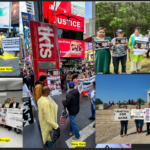
Save Hindu Daughters from – Love Jihad, Human Trafficking and Narcotics Mafia

United States (NYC, DC Atlanta, Chicago): On April 28 Sunday, several members of the Indian diaspora gathered at the iconic Time Square to voice their outrage over the brutal killing of a Hindu girl Neha Hiremath by Fayaz on a university campus in Karnataka, India . Similar rallies were organized at other locations including the Lincoln memorial in DC as well as in Chicago and Atlanta. Participants expressed profound concern about the pervasive prevalence of what is termed ‘love jihad’ targeting Hindu girls and women across India.
Rally attendees articulated their deep concern that the brutal atrocities seen in the cases of Neha, Shraddha and thousands of many young girls are not isolated incidents but part of a pre-planned, well funded operation known as ‘Love Jihad’ carried out nationwide by a deeply entrenched ecosystem. The brutal stabbing of Neha by Fayaz who attacked her neck 14 times in 30 seconds, and Aftab who dismembered Shraddha into many pieces, along with numerous girls who were stabbed, hanged or beaten into coma are seen as part of an agenda of targeting girls of other religions by certain sections of Muslim community. These girls face two dire choices: succumb to the ecosystem agenda or suffer a brutal fate. This phenomenon affects girls of several religions; for instance, in Kerala, clergy have repeatedly highlighted how thousands of Christian girls are brainwashed and coerced into marriage through ‘love jihad’ and ‘narcotic jihad’. Similar incidents have been reported outside India in countries like UK. where grooming gangs belonging to Pakistani Muslim background target minor girls for sexual exploitation. While the West grapples with political correctness, India contends with apathy, systemic weakness and opportunistic politicians chasing vote banks. Following Neha’s murder in Karnataka state of India, the State Government dismissively attributed it to a case of ‘love gone bad’, despite CCTV footage revealing the extent of unspeakable brutality involved. This response underscores the grim reality faced by Hindu women in India.
Last year, the Organiser portal highlighted at least 60 instances, among hundreds, where young Hindu girls met brutal ends, some dismembered. The OpIndia Love Jihad archives details hundreds of such cases across over 70+ web pages, shedding light on the victims of love Jihad. These reported cases are a minute fraction of the actual cases. Specifically, in the state of Kerala, a significant number of cases, reportedly totaling 34,000, have been brought to public attention through the movie, ‘The Kerala Story’. Even as we reel from the horror of what Neha endured, we learn of mother in the Jehangir area of Delhi who, after her minor daughter was relentlessly harassed by a Minor Mulsim boy, send her to a hostel for safety, only to be visited by the boy and his friends who shot her to death. This was in spite of the mother seeking police help to protect her daughter. These crimes are not isolated, but are supported by a very powerful, well funded ecosystem. Most criminals either abscond or get bail only to commit more crimes with the active support of the ecosystem, with government and police often moving on while victims and their families are left devastated. This love jihad has a variant known as ‘soft’ love jihad where Muslim men, often already married, are paid to entice and marry Hindu (and Christian) girls or vulnerable women, only to be abandoned after having children. Interestingly, the caste of the Hindu woman determines the payment to the Muslim man, higher the caste higher the payments.
“The ultimate goal of this ecosystem is political conquest, achieved by preying on non-Muslim women—either eliminating them or coercing them into producing more Muslims—using the readily available supply of men who have been subjected to religious indoctrination, greatly reinforced by Madrasah education. This agenda is supported by the Western deep state and other anti-India forces for their geopolitical objectives. According to social media reports, the brutality inflicted upon Neha is rooted in a medieval mindset, justified using Quranic scriptures such as the 47th chapter, Sura 4, which instructs Muslims to smite the necks of non-believers, referred to as Kafirs. This brutality is intended to instill fear in the targeted girls, demonstrating what awaits them if they resist conforming to the agenda, and to eliminate any evidence of the ecosystem. It is a misconception that minor girls are simply falling into these traps out of foolishness, without recognizing the sophisticated methods of deceit, narcotics, and blackmail (documented in the movie ‘Kerala Story’), combined with the lack of education on this matter provided to the girls. These factors are resulting in brutal fates for the girls and their families.”
The targeting of girls and young women represents a form of terrorism aimed at political conquest, increasingly intertwined with human trafficking. Both ‘love jihad’ and human trafficking, facilitated by narcotics, constitute a multi-billion-dollar industry that has formed alliances with the media, police officials, politicians, lawyers, and even the judiciary. The self-appointing Indian higher judiciary is more concerned about the rights of criminals and terrorists, with little regard for the fundamental rights of victims and their devastated families. Renowned international journalist Ross Kemp highlighted in his acclaimed ‘Extreme World‘ series that India allocates a larger percentage of its GDP to military spending than the US and invests in multi-billion-dollar space programs, yet fails to address these issues of such magnitude and brutality. The series is based on a deep study of human trafficking originating in West Bengal, which he called one of the five most hellish places on earth. He categorized a Khan who admits on camera that he himself killed 400 girls when the girls turned out to be problematic for local officials, and he has lost thousands of girls trafficked, as the most disgusting person he has met in his entire journalistic career.
The purpose of the Indian constitution is called into question when it fails to safeguard the fundamental rights to life and freedom of young women, and even more distressingly, of minor girls. Where is the deterrence to prevent future crimes? What is the purpose of the so-called National and State Commissions for Women? These burning questions weigh heavily on the minds of those who have studied the matter and participated in the rallies.
Rally participants urge the Indian Government to address these urgent issues with the seriousness they demand. Here are a few suggestions for consideration:
1. Immediate recognition is crucial when a minor girl is targeted, recognizing only two possible outcomes: either the victim succumbs to the agenda or faces brutal harm. Upon receiving a report of such an issue, the police must act swiftly to prevent these outcomes, ensuring robust protection for the girl and her family. This should be coupled with prompt investigation and arrest of the perpetrator and any accomplices. Such situations should be treated with the same urgency as a pre-planned terrorist act.
2. For each barbaric crime, the establishment of fast-track courts and the imposition of mandatory death sentences on the criminal and accomplices within a specified period are necessary. Any local government official found concealing the crime should face charges and receive a death sentence as well. The destruction of initial evidence by compromised officials should be considered a severe crime warranting strict punishment.
3. The introduction of a well-publicized national hotline for victims and their families is essential, with involvement from both state and central authorities upon case reporting. Should state support be lacking due to political reasons, family members must have the ability to directly request intervention from the central government without requiring state approval. This ensures that victims and their families receive immediate assistance and support, regardless of any political obstacles at the state level.
4. Empowering the National Commission for Women (NCW) with the authority to question local government officials is imperative. The NCW should be tasked with documenting every case, providing legal support to victims and their families, and ensuring updates on case progress are publicly available. To execute these responsibilities effectively, the NCW could outsource tasks while maintaining oversight. Any lapses in fulfilling these duties should be met with staff dismissals and possible charges, ensuring accountability and diligence in addressing cases of gender-based violence.
5. Implementing a nationwide ban on Madrassah education that contributes to radicalization and the exploitation of women for political ends and profiteering using their bodies is a significant step towards combating such issues. This ban should be accompanied by comprehensive reforms in the education sector to ensure that all children, regardless of their background, receive quality education that promotes tolerance, critical thinking, and respect for human rights
6. Implementing a ban on the practice of slaughtering animals in the presence of young children is essential to protect them from potentially traumatic experiences that can desensitize them to violence and brutality. This measure is particularly important when combined with religious education that may promote hate towards other religions. By prohibiting such practices, we can safeguard the psychological well-being of children and promote a culture of compassion and respect for all living beings.
7. Raising awareness among young girls and women in schools and universities about the concept of love jihad is crucial for their safety and empowerment. It’s important not to shy away from discussing this topic in the name of offending Muslims but to address it factually and sensitively. Providing information about the signs and tactics used in love jihad, along with promoting critical thinking skills and healthy relationship education, can help girls and women make informed choices and protect themselves from manipulation and exploitation.
8. Implementing legislation to address the issue of misinformation spread by ecosystem-supported media and influencers regarding ‘love jihad’ is essential for maintaining social harmony and preventing the spread of hate speech. Drawing inspiration from countries like Germany, which has laws against Holocaust denial, can provide a framework for crafting effective legislation.
9. Taking decisive action against state governments like West Bengal where ruling political parties use violence and rapes as political tools is crucial for upholding the rule of law and ensuring the safety and security of citizens. While dismissing state governments outright may be a drastic measure, invoking Article 351 of the Indian Constitution to take over the law and order of the state could be considered in cases where there is a clear failure of governance and rampant violations of human rights.
10. Establishing an independent commission to thoroughly investigate the entire ecosystem, including human trafficking and narcotics, is a crucial step toward addressing systemic issues and ensuring accountability. This commission should have the authority to conduct impartial investigations, gather evidence, and make recommendations for reforms in Police, Judiciary and laws.
As Ross Kemp has highlighted, failing to address these issues urgently is a considerable disgrace. The global diaspora rallies aim to underscore the critical nature of this situation, calling for immediate action.
Contact: [email protected]
Worldwide Hindu Diaspora












Hi, this is a comment.
To get started with moderating, editing, and deleting comments, please visit the Comments screen in the dashboard.
Commenter avatars come from Gravatar.